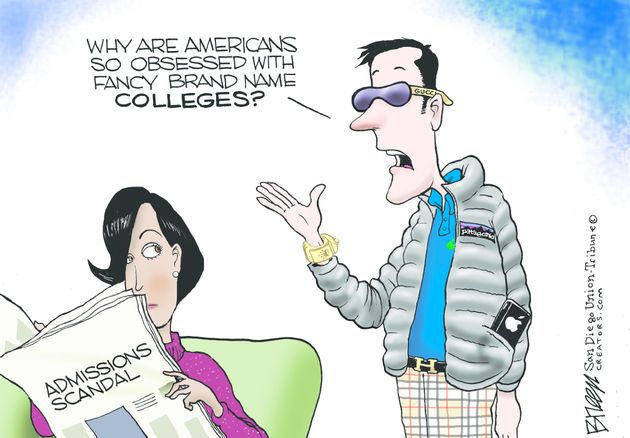The Supreme Court itself is a scam, and it caused the college pay-off scam in the news.
1. The Constitution is the only set of laws that the people of this nation have agreed to be governed by. The Founders knew that, by man's nature, aggrandizement would always be sought; this included the courts. So, March 4, 1794, Congress passed the 11th amendment:
"The Judicial power of the United States shall not be construed to extend to any suit in law or equity, commenced or prosecuted against one of the United States by Citizens of another State, or by Citizens or Subjects of any Foreign State."
2. Rather than having federal courts with the power to decide any kinds of cases, the document ratified by the people, the Constitution, created a federal judiciary which left most judicial power to the state governments.
That would include flag burning, abortion, state government recognition of religion, e.g., public prayer, and homosexual marriage. State courts....not federal.
Gutzman, "The Politically Incorrect Guide to the Constitution," p.26-28.
Federalists who voted to ratify the Constitution were very clear on this issue.
3. This is key: why should the Supreme Court have the ability to tell employers what criteria they can use in hiring?
If it were not for the Griggs decision....there would not be a glut of morons with college degrees, or the recent college bribery scandal.
This decision:
"A 1971 Supreme Court decision, Griggs v. Duke Power, had a lot to do with it, by giving employers a strong incentive to use educational credentials as a proxy for aptitude testing.
Perhaps you have noticed that many jobs that require only basic skills and a cooperative attitude are now walled off to Americans who don’t possess a college degree. A recent study entitled Moving the Goalposts: How Demand for a Bachelor’s Degree is Reshaping the Workforce contains a lot of evidence on that. For example, for sales representatives and retail supervisors, 56 percent of recent job postings specify that having a college degree is a requirement.
This doesn’t mean that those jobs have such high intellectual demands that no one without a college degree could possibly do them. What it means is that these companies won’t bother with anyone with lower educational credentials.
Our mania for college credentials works strongly against upward mobility for individuals who, for whatever reason, don’t have a college degree. They are confined to the shrinking and mostly low-pay segment of the labor market where educational credentials still don’t matter. "
Thank (Or Blame) The Supreme Court For Credential Inflation
Today, college, and certainly the top colleges, serve simply as credentializations and not for learning.
1. The Constitution is the only set of laws that the people of this nation have agreed to be governed by. The Founders knew that, by man's nature, aggrandizement would always be sought; this included the courts. So, March 4, 1794, Congress passed the 11th amendment:
"The Judicial power of the United States shall not be construed to extend to any suit in law or equity, commenced or prosecuted against one of the United States by Citizens of another State, or by Citizens or Subjects of any Foreign State."
2. Rather than having federal courts with the power to decide any kinds of cases, the document ratified by the people, the Constitution, created a federal judiciary which left most judicial power to the state governments.
That would include flag burning, abortion, state government recognition of religion, e.g., public prayer, and homosexual marriage. State courts....not federal.
Gutzman, "The Politically Incorrect Guide to the Constitution," p.26-28.
Federalists who voted to ratify the Constitution were very clear on this issue.
3. This is key: why should the Supreme Court have the ability to tell employers what criteria they can use in hiring?
If it were not for the Griggs decision....there would not be a glut of morons with college degrees, or the recent college bribery scandal.
This decision:
"A 1971 Supreme Court decision, Griggs v. Duke Power, had a lot to do with it, by giving employers a strong incentive to use educational credentials as a proxy for aptitude testing.
Perhaps you have noticed that many jobs that require only basic skills and a cooperative attitude are now walled off to Americans who don’t possess a college degree. A recent study entitled Moving the Goalposts: How Demand for a Bachelor’s Degree is Reshaping the Workforce contains a lot of evidence on that. For example, for sales representatives and retail supervisors, 56 percent of recent job postings specify that having a college degree is a requirement.
This doesn’t mean that those jobs have such high intellectual demands that no one without a college degree could possibly do them. What it means is that these companies won’t bother with anyone with lower educational credentials.
Our mania for college credentials works strongly against upward mobility for individuals who, for whatever reason, don’t have a college degree. They are confined to the shrinking and mostly low-pay segment of the labor market where educational credentials still don’t matter. "
Thank (Or Blame) The Supreme Court For Credential Inflation
Today, college, and certainly the top colleges, serve simply as credentializations and not for learning.



